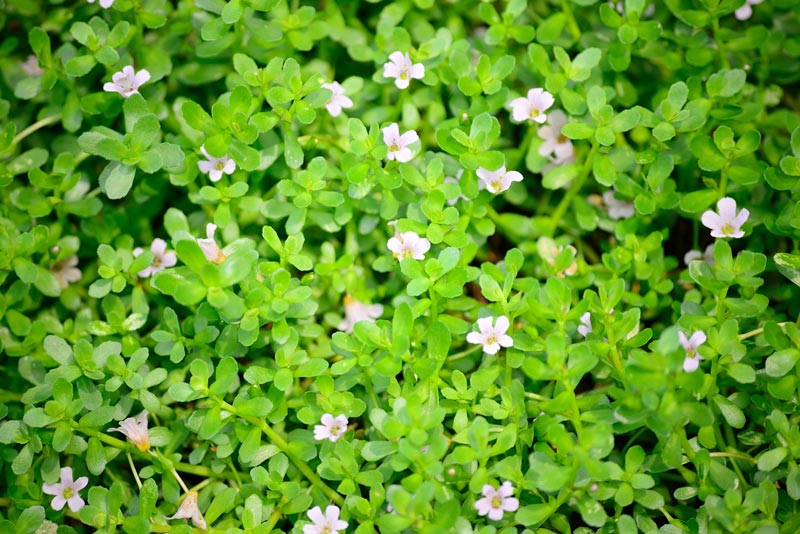
The Health Benefits of Brahmi (Bacopa monnieri)
Bacopa monnieri is a lovely, flowering herb with small, succulent leaves. It grows in the marshy wetlands of India, Australia, Europe, Africa, Asia, and the Americas. It flourishes under water which is why it’s often found in aquariums. Bacopa is known by many names including Indian Pennywort, Thyme-Leaved Gratiola, Herb of Grace, Water Hyssop and Brahmi.
Bacopa’s healing nature has been the subject of several studies in which research has been conducted on both animals and humans. It’s natural antioxidants and phyto-chemicals make it of particular interest, especially when it comes to enhancing and supporting brain health. The studies invariably show that Bacopa has numerous positive effects on memory, cognition, focus, clarity and learning. It’s also useful in regulating and decreasing many of the symptoms and side effects of anxiety, poor moods, cognitive decline, epilepsy, stress and more.
Bacopa is “an outstanding nervine tonic” which supports concentration, comprehension, recall and alertness. There is mounting scientific evidence that supports Bacopa’s use in enhancing brain function and supporting attention, memory and cognitive function in the elderly, including its potential therapeutic treatment of dementia and cognitive decline. These actions are due to potent antioxidants and medicinal compounds called “bacosides”. In an overview of Bacopa published by the National Institutes of Health (NIH), researchers make the claim that Bacopa and it’s isolated bacosides “have been extensively investigated in several laboratories for their neuropharmacological effects (referring to the effect of a drug on the nervous system), and a number of reports are available confirming their nootropic action” (referring to cognitive-function or memory-enhancing effects).
Bacopa shows a promising therapeutic effect on epilepsy and the consequent memory and mood problems which often ensue. It’s also useful for focusing attention and improving memory. In this 6-week study on Bacopa and the cognitive function of medical students, researchers concluded that Bacopa significantly improves the brain’s ability to quickly process information, increase the rate of learning, enhance memory consolidation, decrease anxiety and improve “higher-order” cognitive processes like learning and memory.
For centuries, practitioners of ancient Ayurveda have known about the healing effects of Bacopa on the body, mind and chakras (various energy centers in the body). It is “sattvic” in nature, meaning it encourages purity and clarity, and because it is “tridoshic”, it can support the well-being of all three doshas (constitutional types) known as Vata, Pitta and Kapha. In Ayurveda, Bacopa is called Brahmi which translates to mean “the energy of Brahma” - the Creator of the Universe. The name comes from the word Brahman, referring to Pure Consciousness. There is sometimes confusion between Bacopa and Gotu Kola which is also called Brahmi in India. While both herbs are used to support a healthy brain, they are not the same in Ayurveda. Please consult with a practitioner specifically trained in Ayurveda to determine which herb is best for you.
As with all medicinal herbs, we recommend you consult a qualified health care practitioner if you are pregnant, nursing, taking any medications or have a medical condition, or if you experience an allergic reaction.
